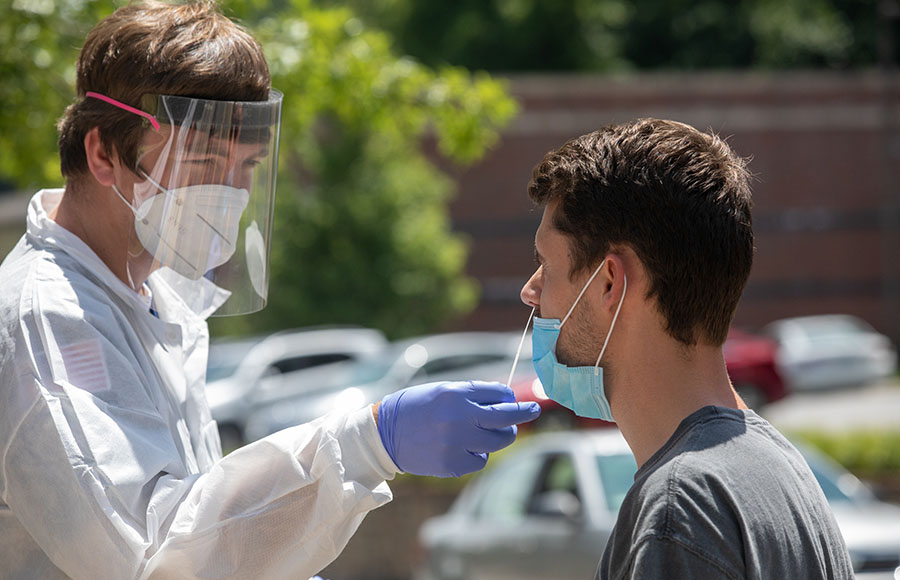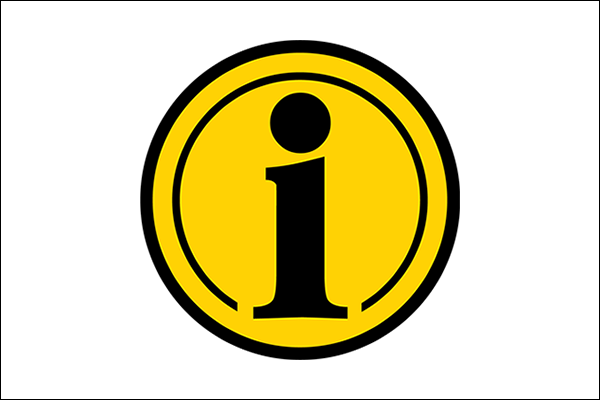
Appalachian State University senior Gable Dershem, an exercise science major from Clayton, right, was among the students, staff and faculty who took advantage of free COVID-19 testing at App State during 2020. A total of 31,293 tests were administered during the fall 2020 semester. Photo by Marie Freeman
BOONE, N.C. — A total of 31,293 COVID-19 tests were administered by Appalachian State University to faculty, staff and students during the fall 2020 semester — representing the majority of tests conducted in Watauga County. The tests were offered at no cost to participants.
App State, which coordinates its COVID-19 response with the University of North Carolina System, held 42 open, campuswide testing events since Aug. 10, in addition to daily testing available for students at the M.S. Shook Student Health Service. There were also targeted testing events for student-athletes and residential students in response to clusters identified by local public health agency AppHealthCare.
“Early in the year, Chancellor Everts prioritized offering accessible testing to students, faculty and staff,” said Jason Marshburn, director of environmental health, safety and emergency management at App State. “Broad-based testing of the campus community has allowed the university to quickly identify and isolate positive cases of COVID-19, which helped keep the university’s positivity rates down.”
Marshburn explained that broader testing and lower positivity rates not only aided in lowering transmission risk but also helped reduce the strain on the university’s COVID-19 response resources.
In most cases, those tested at App State received test results in under 24 hours — much faster than the national average of 72 hours — which improved the reaction time for quarantine procedures and contract tracing and notification.
Raleigh-based MAKO Medical Laboratories, a full-service laboratory performing COVID-19 testing across the United States, conducted the majority of testing events on App State’s campus, using polymerase chain reaction (PCR) tests to diagnose current infections.
The tests are considered 100% accurate, according to Chad Price, CEO of MAKO. All positive results are verified by the lab on a second instrument to ensure there are no false positives.
“App State is one of the top universities in the country for their COVID response,” Price said. “They provide testing for free, while other colleges often charge their students. Appalachian hosts regular, consistent events, while some other schools held a single-day event.”
MAKO worked with several western counties in North Carolina — including those serviced by AppHealthCare — to perform community testing early in the pandemic. App State partnered with the lab to test student-athletes as they began returning to campus in the summer, then the university expanded testing to serve the entire App State population.
In addition to widespread testing, the university took other measures to address the pandemic, which will continue in the spring 2021 semester:
- University leaders met twice weekly with the North Carolina Department of Health and Human Services (NCDHHS) COVID response team, and daily with AppHealthCare.
- Daily health self-assessments were required for all members of the Appalachian Community prior to leaving a residence hall or coming to campus.
- Enhanced cleaning and sanitizing procedures were employed.
- Physical distancing and face coverings were required on campus.
- All students moving into residence halls in the spring semester will be required to show a negative COVID-19 test result prior to moving in.
App State’s campuswide testing schedule may be viewed on the university’s COVID-19 website.
What do you think?
Share your feedback on this story.
About Appalachian State University
As a premier public institution, Appalachian State University prepares students to lead purposeful lives. App State is one of 17 campuses in the University of North Carolina System, with a national reputation for innovative teaching and opening access to a high-quality, cost-effective education. The university enrolls more than 21,000 students, has a low student-to-faculty ratio and offers more than 150 undergraduate and 80 graduate majors at its Boone and Hickory campuses and through App State Online. Learn more at https://www.appstate.edu.




![How NCInnovation Is Rethinking Economic Development in North Carolina [faculty featured]](/_images/_posts/2026/02/rethinking-economic-development-600x400.jpg)







